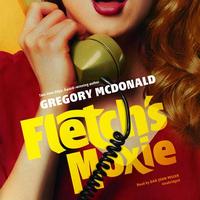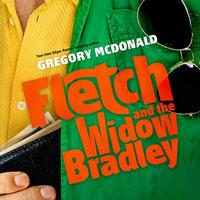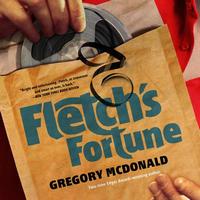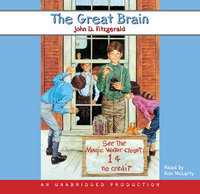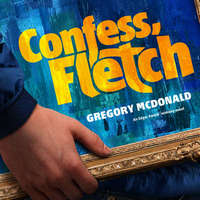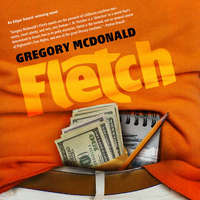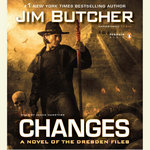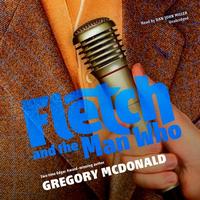 Fletch and the Man Who
Fletch and the Man Who
by Gregory McDonald, Dan John Miller (Narrator)
Series: Fletch, #6 (#8 Chronologically)Unabridged Audiobook, 6 hrs., 14 min.
Blackstone Audio, 2018
Read: May 14 – 18, 2019

“Good morning,” Fletch said. “As the governor’s press representative, I make you the solemn promise that I will never lie to you. Today, on this bus, we will be passing through Miami, New Orleans, Dallas, New York, and Keokuk, Iowa. Per usual, at midday you will be flown to San Francisco for lunch. Today’s menu is clam chowder, pheasant under glass, roast Chilean lamb, and a strawberry mousse from Maine. Everything the governor says today will be significant, relevant, wise, to the point, and as fresh as the lilies in the field.” …
“Is it true you saved Walsh Wheeler’s life overseas?” Fenella Baker asked.
“That’s another thing,” Fletch said. “I will never evade any of your questions.” He turned the microphone off and hung it up.
I think this is my favorite Fletch novel (that spot may actually bounce between this and Fletch’s Fortune), and I could practically recite portions of this with Miller’s narration while driving. This doesn’t mean I didn’t catch anything new, it just means that I enjoyed this time through immensely.
An old Army buddy (and C.O.) of Fletch’s calls him up for a favor — his father, Caxton Wheeler, is running for an unnamed party’s presidential nomination and has just had to fire their long-term press secretary, could Fletch step in? Minutes before Fletch arrives at the hotel the campaign is using a young woman plunged to her death from one of the rooms on the higher floors (later shown to be the candidate’s room). Fletch’s first job is to discover if she jumped or was pushed — and then to make sure that it had nothing to do with the campaign.
Sadly, it appears she was pushed — and she was associated with the campaign. Even worse, it seems like she’s the latest in a string of dead women near the campaign. Giving Fletch a quandary. He needs to figure out who is doing this killing (assuming it’s one person), insulate the candidate — and keep anyone else (i.e. the press) from printing the facts.
Fletch as an obstacle/opponent/facilitator (all at the same time) of the press in any shape is just a lot of fun. His instincts, training, and inclination is to dig into a story, find the facts on his own, and run the story. His new job is to feed information to reporters, keep them from doing any fact-finding on their own, and to hide aspects of the story. It is so fun to watch him struggle in this role.
Particularly because one of the reporters on the press bus is Freddie Arbuthnot, someone who might be a better reporter than Fletch. She’s certainly more employable than he is — as she’s a crime reporter, her presence on the campaign tells Fletch a lot about how serious this string of murderers is. Also, she’s a whole lot of fun as a character, so the reader gets something out of it, too.
Speaking of returning characters, we get Alston Chambers again — I need to do a better job of tracking his career path, but I think he’s moved up in the world a bit since we saw him last, so good for him. Alston served with Fletch under Walsh Wheeler and provides some vital information for his friend. He’s also just a great guy for Fletch to talk to and bounce things off of, helping both the character and reader to process what’s going on.
So who are the recipients for Mcdonald’s critique/satire? There are so many — tabloids (particularly the mid-80s version of them), politics, the press’ political coverage (about the horse race, not the ideas/work), pressures on a candidate (Wheeler is given drugs to wake up, keep him going and then to go to sleep because there’s no way that he could do that naturally with the pressures/pace of the campaign). Given his target-rich environment, the book could’ve been twice as long just to give Fletch the opportunity to tilt at a few more windmills and wouldn’t have lost much of its punch. Like I said with Fletch’s Moxie, it seems like his satire is even more on-point now than it was thirty years ago. Which really shouldn’t be the case.
I appreciated the fact that Mcdonald left party names out of this, and none of Wheeler’s policies can be easily labeled as belonging to one of the major parties. Anyone can read him as being one of their own (or, if they’re so inclined, one of the other guys). There’s not targeting or critique of a particular party, just the entire process.
At one point, inspired by a conversation he has with Fletch, Wheeler has a moment of statesmanship (a no-no for a candidate, Fletch is told) where he talks about the ways that technology is connecting the planet and helping share information in ways unthinkable generations earlier, and talks about how it will increase in that way. Essentially predicting the Internet as we know it. Granted, it’s a more utopian vision of the Internet rather than the dumpster fire it frequently is. But Wheeler/Mcdonald has a vision for what today is in a way that no mystery writer in 1983 should’ve.
Caxton Wheeler and his driver, Flash, will show up in a Flynn book that takes place sometime before this. They’re not there a lot, but I remember the first time I read that and it blew my mind (that was my second Flynn novel and I’d yet to find Confess, Fletch so I had no idea the universes were linked) while in Middle School.
Dan John Miller is great yet again — I’ve got nothing new to say about him. I need to track down some of his other narrations, see what I think of them.
Mcdonald shifts gears with his writing and the series after this, and I really, really wish he wouldn’t have. A few more books in the vein of Fortune, Moxie, and The Man Who would’ve been a boon to his readers, and would’ve solidified Mcdonald amongst the all-time greats. I’m sure he had his reasons, but from my vantage point (now and for the last couple of decades), he shouldn’t have. In the meantime, this work is a great mystery, fantastic commentary on politics and the media, and even a bit of prescience — bundled together with Mcdonald’s sharp prose, winning dialogue and characters that demand to be re-read. I can’t recommend Fletch and the Man Who highly enough.
—–
![]()




